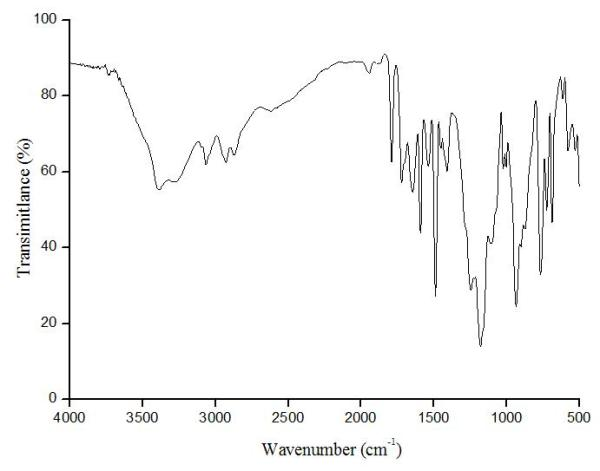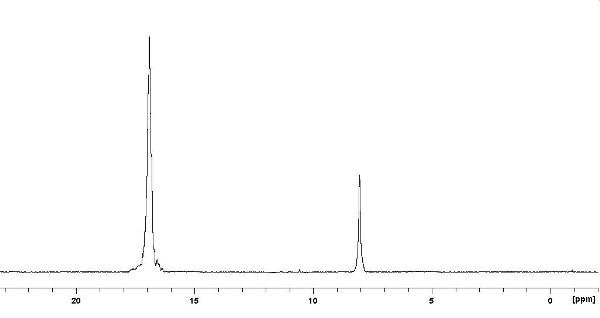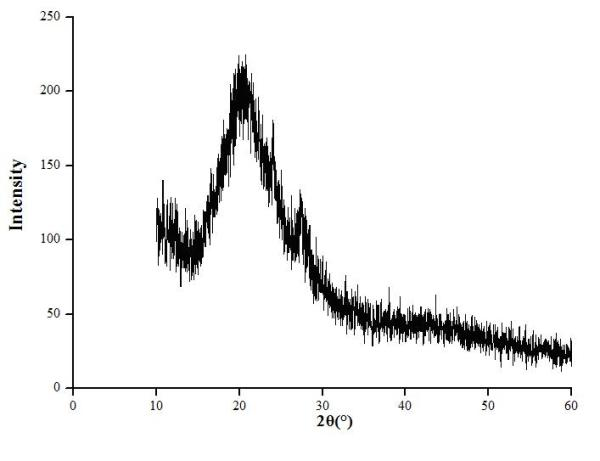Polyphosphazene-semi-aromatic amide material and preparation method thereof
A semi-aromatic amide and polyphosphazene technology, which is applied in the field of polyphosphazene-semi-aromatic amide materials and its preparation, can solve the problems of single material solubility and harsh processing and preparation technology, and achieve good thermal stability and good polarity The effect of solution solubility and good application prospects
- Summary
- Abstract
- Description
- Claims
- Application Information
AI Technical Summary
Problems solved by technology
Method used
Image
Examples
Embodiment 1
[0025] The synthesis of polyphosphazene-semiaromatic amide material is realized through the following steps:
[0026] (1) In a 500mL three-neck flask equipped with magnetic rotor stirring, condenser and thermometer, dissolve hexachlorocyclotriphosphazene (17.4g 0.05mol) prepared by multiple sublimation in 50mL tetrahydrofuran (THF) solvent, add dropwise Prepared (2.32g 0.2mol) sodium phenate (under nitrogen protection, (4.6g 0.2mol) sodium metal and (18.822g 0.2mol) phenol reacted in 50mL THF solution at 25°C for 2 hours) THF solution, nitrogen Protected and reacted at 40°C for 12 hours. THF was removed by rotary distillation, washed several times with deionized water, and vacuum-dried at 50°C for 24 hours to obtain a milky white colloid.
[0027] (2) In a 500mL three-neck flask equipped with magnetic rotor stirring, a condenser tube, and an HCl absorption device, dissolve the (10.37g 0.018mol) milky white colloid obtained in step (1) in 50mL of THF solvent, and add (2.4 g 0...
Embodiment 2
[0030] The synthesis of polyphosphazene-semiaromatic amide material is realized through the following steps:
[0031] (1) In a 500mL three-neck flask equipped with magnetic rotor stirring, condenser and thermometer, dissolve hexachlorocyclotriphosphazene (13.9g 0.04mol) prepared by multiple sublimation in 50mL tetrahydrofuran (THF) solvent, add dropwise Prepared (1.856g 0.16mol) sodium phenate (under nitrogen protection, (3.68g 0.16mol) metal sodium and (15.06g 0.16mol) phenol reacted in 50mL THF solution at 25°C for 2 hours) THF solution, nitrogen Protected and reacted at 40°C for 12 hours. THF was removed by rotary distillation, washed several times with deionized water, and vacuum-dried at 50°C for 24 hours to obtain a milky white colloid.
[0032] (2) In a 500mL three-neck flask equipped with a magnetic rotor stirring, a condenser, and an HCl absorption device, dissolve the (11.52g 0.02mol) milky white colloid obtained in step (1) in 50mL of THF solvent, and add (2.4 g 0...
Embodiment 3
[0035] The synthesis of polyphosphazene-semiaromatic amide material is realized through the following steps:
[0036] (1) In a 500mL three-neck flask equipped with magnetic rotor stirring, condenser and thermometer, hexachlorocyclotriphosphazene prepared by multiple sublimation (34.8g 0.1mol) was dissolved in 100mL tetrahydrofuran (THF) solvent, and added dropwise Prepared (9.28g 0.4mol) sodium phenate (prepared by reacting (9.2g 0.4mol) metal sodium and (37.64g 0.4mol) phenol in 100mL THF solution at 25°C for 2 hours under nitrogen protection) THF solution, nitrogen Protected and reacted at 40°C for 24 hours. THF was removed by rotary distillation, washed several times with deionized water, and vacuum-dried at 50°C for 24 hours to obtain a milky white colloid.
[0037](2) In a 500mL three-necked flask equipped with a magnetic rotor stirring, a condenser, and an HCl absorption device, dissolve the (28.81g 0.05mol) milky white colloid obtained in step (1) in 100mL THF solvent,...
PUM
 Login to View More
Login to View More Abstract
Description
Claims
Application Information
 Login to View More
Login to View More - R&D
- Intellectual Property
- Life Sciences
- Materials
- Tech Scout
- Unparalleled Data Quality
- Higher Quality Content
- 60% Fewer Hallucinations
Browse by: Latest US Patents, China's latest patents, Technical Efficacy Thesaurus, Application Domain, Technology Topic, Popular Technical Reports.
© 2025 PatSnap. All rights reserved.Legal|Privacy policy|Modern Slavery Act Transparency Statement|Sitemap|About US| Contact US: help@patsnap.com



